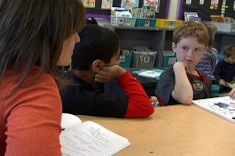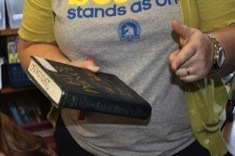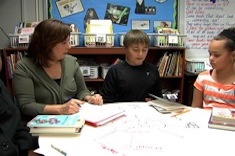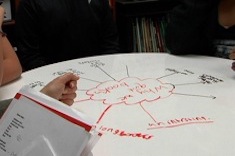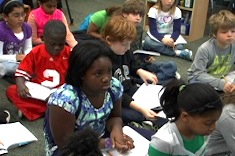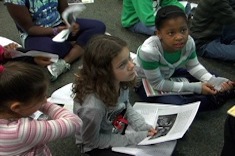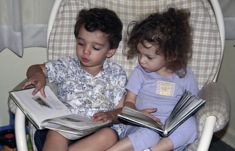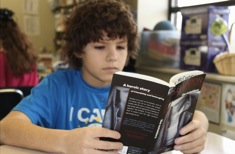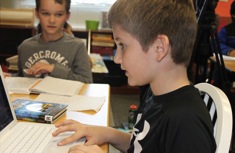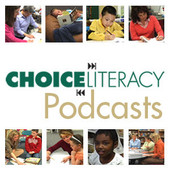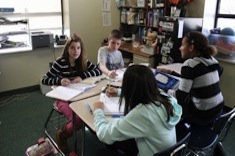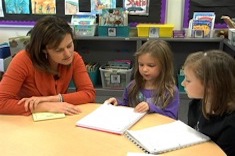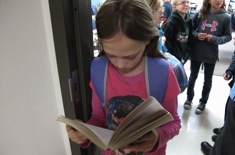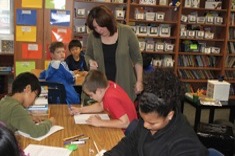Teaching Reading
Our contributors lead reading workshops in classrooms with creative flair. Over the past 12 years, we've filled our site with loads of suggestions, tools, and tips for using engaging books throughout the curriculum to hook kids on reading. Here is where you will find many stories of successful and not-so-successful workshop days, and what we learned from them. We bring these stories to life through hundreds of video examples.
Latest Content
Partner Reading Conference in First Grade
Katie DiCesare confers with Jack and Praneel about their partner reading.
Strong Girls Book Group
Franki Sibberson shares a range of books that include compelling female characters with a group of fourth-grade girls.
She Wants to Be Katniss for Halloween: Courageous Girls in Books
Shari Frost celebrates a tomboy who finally finds a female character she wants to emulate with a booklist highlighting courageous girls.
Group Conference in First Grade
Katie DiCesare meets with first graders Anna and Brendan to help them learn from each other and prepare to share their rereading strategies with the whole class.
Research Book Clubs for Struggling Readers
Beth Lawson finds that a nonfiction research book club is just the grouping structure needed for a group of struggling readers in her fourth-grade classroom.
Holding Thinking Minilesson with Second Graders
Deb Gaby uses an analogy of animal tracks to introduce the concept of "holding thinking" in reading journals to second graders.
The Art of the Book Talk
If you want to match students to books, you’ll need to master the art of the book talk. Katherine Sokolowski has practical tips for honing your skills.
Building Stamina and Book Choice Skills
Franki Sibberson continues a discussion with a small group of students who often abandon books. This is the second installment in a two-part video series.
Abandoning Books Discussion
Franki Sibberson works with a small group of fourth graders who often abandon books.
October Literacy Contracts: Fear and Conflict
Megan Ginther and Holly Mueller continue their monthly series on using literacy contracts in middle school. The October literacy contracts have a theme of fear and conflict.
Whole-Class Research Planning
Andrea Smith leads her fourth graders through brainstorming for their owl research project.
“We Gather Together”: On Research and Weddings
Ruth Ayres and her colleagues use a marriage analogy to help middle school students and their families understand the research process. The article includes a nifty example of a pamphlet to share with parents.
Limiting and Extending Choice in Student Research Projects
When students are able to pick any research topic, they often will choose something they have already studied extensively. How can teachers allow students to pick topics for research they care passionately about and at the same time ensure there is the potential for rich inquiry? Maria Caplin describes the process she uses in her fifth-grade classroom to help students find and refine research topics for deeper learning.
Keeping Kids Safe on the Internet
Julie Johnson provides helpful tips and a letter for parents to help keep students safe on the Internet.
Kidwatching and Connections in the Early Days
Cathy Mere finds the early days of school are all about kidwatching and connecting with her first-grade students during reading and writing workshops. She shares some terrific guiding questions that might also help new teachers hone their observation skills.
Owl Research: Whole Class Explanation of Marking Up Text
Students are given a nonfiction text to mark up during a close reading with a partner in this video from Andrea Smith’s fourth-grade classroom.
Emphasizing Empathy: September Literacy Contracts
Megan Ginther and Holly Mueller are Emphasizing Empathy in their September literacy contracts for middle school students.
How to Eat an Elephant One Bit(e) at a Time: Reading Complex Texts
Maggie Beattie Roberts and Kate Roberts present a step-by-step process for close reading in the middle and high school grades involving multiple passes through the same text.
Lessons from Listening to Toddlers Read (Home Is Where the Books Are Series)
What can you learn from having toddlers "read" to you? Plenty, as Meghan Rose soon discovers.
Chris Lehman and Kate Roberts on Close Reading (PODCAST)
Franki Sibberson chats with Chris Lehman and Kate Roberts about close reading in this 30-minute podcast. Chris and Kate are the authors of Falling in Love with Close Reading: Lessons for Analyzing Texts — and Life from Heinemann.
The Cure for Value-Added Grief? Teacher Research
Gretchen Taylor goes through the stages of "value-added grief" when her sixth-grade team receives disappointing test scores from the state. Teacher research helps her find joy again in her classroom, as well as some useful strategies for helping a group of struggling readers.
Conferring in 4th Grade: The Dilemma of Multiple Novels
Melissa Styger confers with a fourth-grade student who is reading two novels simultaneously, and shares her criteria for determining when it’s appropriate for students to read multiple texts.
Literacy Contracts: Introduction
Megan Ginther and Holly Mueller present Reading Contracts, a system for middle and high school teachers that involves students contracting to complete specific texts and tasks each month.
Using Technology to Connect Young Readers and Writers
Julie Johnson reflects on how technology is changing her own reading community, and builds on this knowledge to connect readers and writers in her classroom with others through the Internet.
Global Read Aloud with Pernille Ripp (PODCAST)
Franki Sibberson chats with Pernille Ripp about the Global Read Aloud initiative.
Reimagining Reading Notebooks
When premade reading notebooks no longer fit into her reading budget, Katherine Sokolowski comes up with a unique design starting with generic notebooks, and in the process figures out what’s most important to include.
Notebooks, Goals, and Writing About Characters in First Grade
Katie DiCesare confers with a group of first graders about their writing notebooks, goals, and drafts about the characters they are studying during reading workshop.
What Data Will You Be Collecting?
Tony Keefer explains why attitudinal survey data is important to collect early in the year, and shares different reading surveys he uses with students to understand their needs in the first six weeks of school.
Rethinking the Assessment Binder
Franki Sibberson’s dilemma? How to file every evaluation so it is organized and accessible (since she never knows when someone might ask for it), while still finding a way to keep the assessments she needs every day at her fingertips.
Daily Routines: Finding Time for What Matters
Ann Marie Corgill provides some guiding questions to help teachers figure out priorities in their schedules for daily routines.
Browse Content By
Type
Category
- Assessment Tools
- Big Fresh Archives
- Booklists
- Choice Numeracy
- Classroom Design
- Common Core
- Community Building
- Conferring
- Content Literacy
- Digital Literacy
- English Language Learners
- Equity
- Family Relations
- Free Samples
- Guiding Groups
- Leadership
- Literacy Coaches
- Mentor Texts
- Minilessons
- New Teacher Mentors
- Podcasts
- Poetry
- Quote Collections
- Reading Strategies
- Self Care
- Struggling and Striving Learners
- Talking and Listening
- Teacher Study Groups
- Teaching Reading
- Teaching Writing
- Word Study and Vocabulary
Author
- Melissa Quimby
- Nawal Qarooni
- Gwen Blumberg
- Julie Cox
- The Lead Learners
- Hannah Tills
- Josie Stewart
- Ruth Metcalfe
- Mallory Messenger
- Becca Burk
- Jodie Bailey
- Vivian Chen
- Mary Brower
- Tiffany Abbott Fuller
- Stephanie Affinito
- Ruth Ayres
- Leigh Anne Eck
- Heather Fisher
- Shari Frost
- Julie Johnson
- Suzy Kaback
- Gigi McAllister
- Shirl McPhillips
- Melanie Meehan
- Cathy Mere
- Debbie Miller
- Tara Barnett and Kate Mills
- Tammy Mulligan
- Dana Murphy
- Bitsy Parks
- David Pittman
- Brenda Power
- Heather Rader
- Matt Renwick
- Mandy Robek
- Christy Rush-Levine
- Gretchen Schroeder
- Jen Schwanke
- Brian Sepe
- Katherine Sokolowski
- Stella Villalba
- Jennifer Vincent
Grade Level
Choice Literacy Membership
Articles
Get full access to all Choice Literacy article content
Videos
Get full access to all Choice Literacy video content
Courses
Access Choice Literacy course curriculum and training

